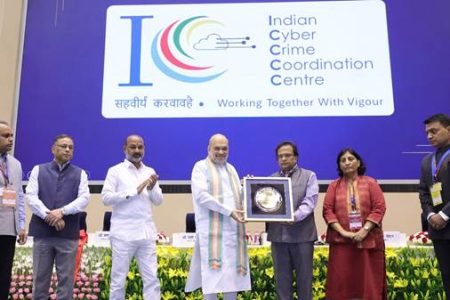New Delhi: Union Home Minister and Minister of Cooperation, Amit Shah, graced the first Foundation Day program of the Indian Cyber Crime Coordination Centre (I4C) today at Vigyan Bhavan. As the Chief Guest, Shah unveiled a series of initiatives aimed at preventing cyber crimes, emphasizing the growing importance of cybersecurity in the digital age.
Among the key initiatives launched were the Cyber Fraud Mitigation Centre (CFMC) and the Samanvay platform—a joint cyber crime investigation facility. Shah also inaugurated the Cyber Commandos Program, aimed at training 5,000 specialized personnel over the next five years, and introduced the Cyber Suspect Registry, a national database for tracking cybercriminals across states.
Amit Shah highlighted the role of I4C, founded in 2015 under the ‘Safe Cyber Space’ campaign initiated by Prime Minister Narendra Modi, in bolstering India’s cybersecurity infrastructure. He stressed that the country’s development hinges on robust cyber defenses, as the increasing reliance on technology brings new risks that extend beyond the digital world into national security.
“Cybercrime knows no boundaries,” Shah noted, underlining the need for collaboration among states to effectively combat the menace. He urged all stakeholders, including banks, financial institutions, telecom companies, and the police, to join forces on the CFMC platform to protect India’s vast digital ecosystem.
To raise public awareness, the Home Minister announced the launch of a national campaign that will be promoted through 72 TV channels, 190 radio stations, cinema halls, and other media outlets. He emphasized the importance of educating citizens on how to avoid becoming victims of cyber fraud, citing the national cybercrime helpline 1930 as a critical tool for prevention.
India’s digital transformation, driven by initiatives like Digital India, has seen exponential growth in internet users—from 25 crore in 2014 to 95 crore by 2024. With the surge in digital transactions—India now accounts for 46% of global digital transactions— Shah emphasized the pressing need for cybersecurity.
He also pointed out that with more than 35 crore Jan Dhan accounts and 36 crore Rupay debit cards, safeguarding citizens’ financial data is paramount. “As digital accounts and transactions grow, so does the threat of cyber fraud,” he warned, adding that critical issues like data theft, online harassment, and misinformation campaigns need stronger responses.
Shah also highlighted the importance of India’s new cyber-focused criminal laws—the Bharatiya Nyaya Sanhita (BNS), Bharatiya Nagrik Suraksha Sanhita (BNSS), and Bharatiya Sakshya Adhiniyam (BSA)—which provide a legal framework for the country’s cybersecurity efforts. The Union Home Minister emphasized the need for scientific investigation methods and robust enforcement to tackle the growing cyber threats.
He praised I4C’s achievements, particularly the 1930 national cybercrime helpline and the creation of 7 Joint Cyber Coordination Teams across high-crime areas like Mewat and Jamtara, which have delivered promising results in combating cybercriminals.
While acknowledging the progress made by I4C over the past nine years, Shah asserted that more needs to be done to achieve a cyber-secured India. “Our goals are still far away,” he said, calling for a unified, strategic approach to tackling cybercrime.
As India continues its march towards digital empowerment, the Home Minister’s message was clear: cybersecurity must be prioritized as part of national security, and collective efforts are required to make India a global leader in fighting cyber threats.

